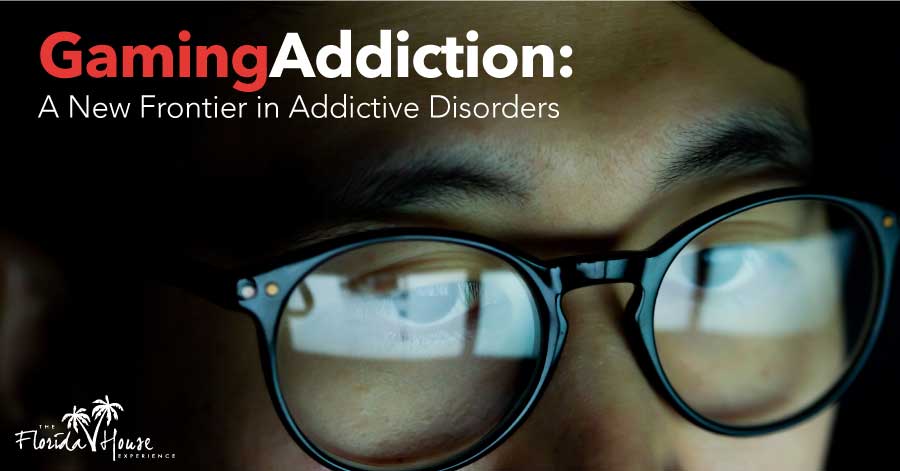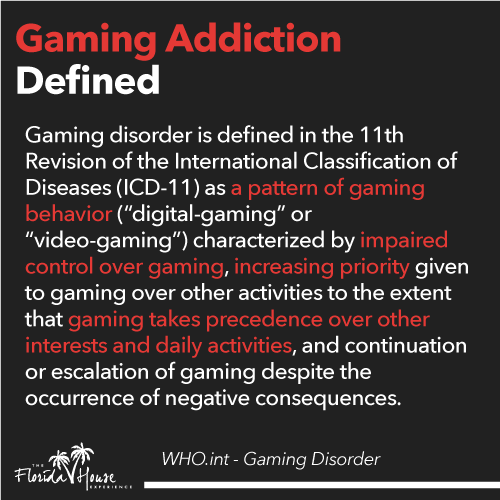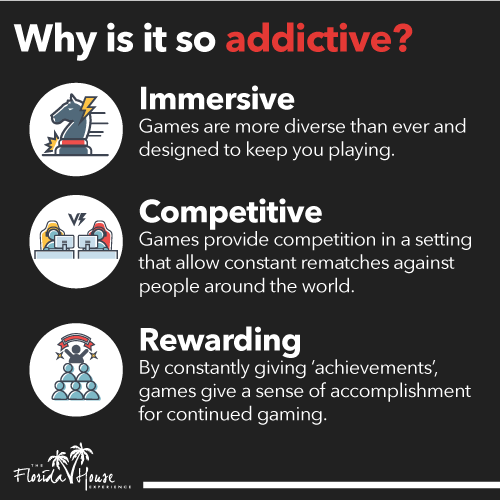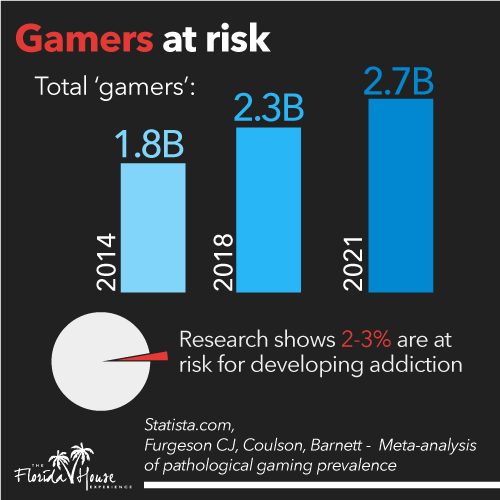
In the past decade, the quality, depth, and selection of video games have increased so much that we’re beginning to see the effects of “gaming addiction” on people of all ages in nearly every corner of the earth.
Many people may brush off the mere existence of an addiction to video games. After all, gaming isn’t nearly as inherently damaging as drugs and alcohol are, right? This is true, but it doesn’t mean a person can’t be addicted to games.
In this article, we’ll talk about gaming addiction, including what it is, and why it’s important to treat it with the seriousness of any mental health or substance abuse condition.
Can a Person Be Addicted to Video Games?
 Theoretically, a person can become addicted to anything. When people do things that they enjoy, such as eating a favorite food, that activity causes a release of dopamine in the pleasure centers of the brain. Dopamine is the chemical that floods the brain when we’re happy, and it’s easy to become dependent on that feeling.
Theoretically, a person can become addicted to anything. When people do things that they enjoy, such as eating a favorite food, that activity causes a release of dopamine in the pleasure centers of the brain. Dopamine is the chemical that floods the brain when we’re happy, and it’s easy to become dependent on that feeling.
In a sense, people who dismiss certain addictions aren’t approaching the issue from the right angle: people aren’t addicted to a specific activity; they’re addicted to the feeling that the activity produces.
With that in mind, some things are easier to get addicted to, and with the increase in the quality and immersive nature of video games in the past few years, it has been the perfect storm to create more and more cases of gaming addiction. Regular people with “regular” lives suddenly find that video games are taking over their existence.
The World Health Organization agreed, going so far as to add addiction to video games to their most recent list of recognized mental illnesses.
Why Is It So Easy to Become Addicted?
 The video game industry is evolving into something that’s bigger than ever before, and the games themselves are reflecting this evolution. Games are bigger and better than ever before, and in a very competitive industry, only the best end up in the collections of gamers across the United States and beyond.
The video game industry is evolving into something that’s bigger than ever before, and the games themselves are reflecting this evolution. Games are bigger and better than ever before, and in a very competitive industry, only the best end up in the collections of gamers across the United States and beyond.
Games are more immersive, meaning that gamers can spend more time playing them without taking a break, and with the rise of multiplayer games, video games also fulfill a social aspect of many people’s lives. This is one of the main reasons why more and more people are being recognized as “video game addicts.”
Another reason is simply that gaming has become much more accepted in the past decade. Before the explosion in gaming connectivity and social play, playing video games was something people did when their friends were over, or by themselves when they were bored, but most games were no more than a hobby.
Today, professional gaming is sweeping the world with massive TV deals, and it’s even becoming a reasonable career choice for some — the International Olympic Committee is considering putting eSports in Olympics in the near future. In the past, gaming was considered a hobby. Today, it’s becoming more legitimate as a career with earning potential that’s increasing annually.
How Can the Addiction Treatment Community Evolve?
 When looking at this new frontier of addictive disorders, it can be difficult to determine how to approach it. After all, FIFA, Fortnite, and Call of Duty are far from existing in the same category as opioids and alcohol. Gaming addiction isn’t life-threatening, although it can certainly ruin the lives of those struggling with it.
When looking at this new frontier of addictive disorders, it can be difficult to determine how to approach it. After all, FIFA, Fortnite, and Call of Duty are far from existing in the same category as opioids and alcohol. Gaming addiction isn’t life-threatening, although it can certainly ruin the lives of those struggling with it.
With that said, looking at the issue in the larger lens of behavioral addiction puts it in a category that the treatment community is actually more experienced at treating. Many people check themselves into mental health facilities to be treated for compulsive behavioral disorders, and many of the same treatment strategies can be used to address gaming addiction.
One thing is clear when we talking about the outlook for people who become addicted to video games: the trend is unlikely to reverse itself, so as a society, the United States and countries worldwide must figure out a way to address video games in the context of public health.
If video games seem to be taking over your life or having a negative effect on your quality of life, there is help available. Call us today at (833) 596-3502 to speak to one of our compassionate counselors and find out how you can start your journey to recovery.






